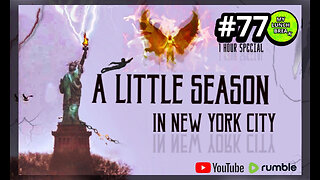Episode 1942: Drawing Near to God in Times of Tribulation
Drawing Near to God in Times of Tribulation
We delve into the profound wisdom of St. John of the Cross and Fr. Thomas Dubay, exploring their insights from a traditional Catholic viewpoint. Through the lens of tribulation and the beauty of the natural world, we contemplate the ways in which we can draw nearer to God, finding strength, enlightenment, and instruction.
Lets start with St. John of the Cross's quote
"In tribulation immediately draw near to God with confidence, and you will receive strength, enlightenment, and instruction."
Let's break down this quote from St. John of the Cross from a traditional Catholic perspective:
"In tribulation": Tribulation refers to times of difficulty, suffering, or distress. In the Catholic tradition, tribulations can take various forms, including physical, emotional, or spiritual challenges.
"Immediately draw near to God with confidence": St. John of the Cross emphasizes the importance of turning to God without delay when facing tribulations. This implies a sense of urgency and reliance on God's presence and assistance. Drawing near to God with confidence suggests trust in His providence and faithfulness, regardless of the circumstances.
"And you will receive strength": By drawing near to God in tribulation, Catholics believe that they receive strength from Him. This strength can manifest in various ways, including physical endurance, emotional resilience, and spiritual fortitude. It is through the grace of God that individuals find the strength to persevere and overcome their trials.
"Enlightenment": In the context of tribulation, enlightenment refers to gaining spiritual insight, understanding, and clarity. Through prayer, reflection, and a deeper connection with God, Catholics believe they can receive enlightenment that helps them make sense of their challenges and discern God's will amidst adversity.
"And instruction": Tribulations offer valuable opportunities for learning and growth in the Catholic faith. St. John of the Cross suggests that by drawing near to God, individuals not only receive strength and enlightenment but also instruction. This instruction may come through the guidance of Scripture, the teachings of the Church, spiritual mentors, or personal discernment, helping individuals navigate their tribulations with wisdom and grace.
Overall, St. John of the Cross encourages Catholics to turn to God with confidence in times of tribulation, trusting in His strength, seeking enlightenment, and being open to His instruction. Through this reliance on God, Catholics believe they can find hope, resilience, and ultimately, spiritual growth amidst life's challenges.
Now lets look at Fr. Thomas Dubay statement but first explain who he was.
Father Thomas Dubay (1921–2010) was an American Catholic priest, author, teacher, and retreat leader. He was born on September 24, 1921, in Martha's Vineyard, Massachusetts, USA.
Fr. Dubay entered the Dominican Order in 1945 and was ordained to the priesthood in 1950. He pursued his studies in philosophy and theology, earning degrees from the Dominican House of Studies in Washington, D.C., and the Pontifical Gregorian University in Rome.
Throughout his life, Fr. Dubay dedicated himself to teaching and spiritual guidance, particularly emphasizing the importance of prayer, contemplation, and the spiritual life. He served as a professor of theology and spiritual director at various institutions, including the Dominican House of Studies and the University of Fribourg in Switzerland.
Fr. Dubay was a prolific writer, authoring numerous books on spirituality, prayer, and the Catholic faith. Some of his most well-known works include "Fire Within: St. Teresa of Avila, St. John of the Cross, and the Gospel—On Prayer," "Deep Conversion/Deep Prayer," and "The Evidential Power of Beauty: Science and Theology Meet."
His writings often explored the mystical tradition of the Catholic Church, drawing from the wisdom of saints such as St. Teresa of Avila, St. John of the Cross, and others. Fr. Dubay had a gift for making complex spiritual concepts accessible to a wide audience, and his works continue to inspire and guide Catholics in their spiritual journey.
Fr. Thomas Dubay passed away on September 26, 2010, leaving behind a legacy of spiritual wisdom and insight that continues to enrich the lives of believers around the world.
He said:
“From the natural point of view we come to know God from the vestiges of Himself that He has left in the splendors of the visible universe: the blazing red sunset, the snow-covered mountain peaks, the graceful flight of a bird, the breathtakingly magnificent complexity of a single living cell. On a still more exalted level we know Him in the loveliness of the saints – but it remains a knowledge of the infinite through the finite.”
Let's break down Fr. Thomas Dubay's quote from a traditional Catholic perspective:
"From the natural point of view we come to know God": Fr. Dubay begins by acknowledging that God can be known through natural means, without the aid of supernatural revelation. This aligns with the Catholic understanding that God's existence and attributes can be perceived through the created order, known as natural theology.
"From the vestiges of Himself that He has left in the splendors of the visible universe": Fr. Dubay emphasizes that God has left traces or vestiges of Himself within the beauty and grandeur of the visible universe. This echoes the Catholic belief that creation reflects the divine attributes of God, revealing His wisdom, power, and beauty.
"The blazing red sunset, the snow-covered mountain peaks, the graceful flight of a bird, the breathtakingly magnificent complexity of a single living cell": Fr. Dubay provides examples of the splendors of the natural world that point towards God's existence and greatness. These examples highlight the diversity, intricacy, and beauty found in creation, all of which serve as reflections of God's creative power and providential care.
"On a still more exalted level we know Him in the loveliness of the saints": Fr. Dubay suggests that while God can be known through the beauty of creation, a deeper and more profound knowledge of Him can be found in the lives of the saints. In Catholic theology, the saints are revered as exemplars of holiness who reflect God's grace and love through their virtuous lives.
"But it remains a knowledge of the infinite through the finite": Fr. Dubay concludes by emphasizing the limitation of human knowledge when it comes to understanding the infinite God through finite created realities. While creation offers glimpses of God's greatness, our comprehension will always be partial and finite in comparison to the infinite depths of God's being.
Overall, Fr. Thomas Dubay's quote underscores the Catholic belief in the revelatory power of creation as well as the importance of the saints as models of holiness. It invites believers to contemplate the beauty and wonder of the natural world as a pathway to encountering the divine, while also recognizing the inherent limitations of human understanding in grasping the infinite mystery of God.
Now let’s wrap up this episode with a scripture verse.
1 John 2:15-17
"Do not love the world or the things of the world. If anyone loves the world, the love of the Father is not in him. For all that is in the world, sensual lust, enticement for the eyes, and a pretentious life, is not from the Father but is from the world. Yet the world and its enticement are passing away. But whoever does the will of God remains forever."
Let's break down 1 John 2:15-17 from a traditional Catholic perspective:
"Do not love the world or the things of the world": This admonition from the Apostle John urges believers to prioritize their love for God over their attachment to worldly pursuits. In Catholic teaching, loving the world in this context refers to becoming overly attached to material possessions, worldly pleasures, and selfish ambitions, which can distract individuals from their devotion to God.
"If anyone loves the world, the love of the Father is not in him": John emphasizes the incompatibility between love for the world and love for God the Father. From a traditional Catholic perspective, placing the love of worldly things above love for God indicates a disordered attachment and a failure to fully embrace the teachings of Christ.
"For all that is in the world, sensual lust, enticement for the eyes, and a pretentious life, is not from the Father but is from the world": John identifies specific worldly temptations, including sensual desires, materialistic cravings, and prideful pursuits. From a Catholic viewpoint, these temptations are considered contrary to the values of the Gospel and are often associated with sinfulness and spiritual emptiness.
"Yet the world and its enticement are passing away": This verse highlights the transient nature of worldly pleasures and pursuits. In Catholic theology, the world's allurements are seen as fleeting and temporary, contrasting with the eternal values of the Kingdom of God.
"But whoever does the will of God remains forever": John contrasts the impermanence of worldly pursuits with the enduring significance of doing God's will. From a traditional Catholic perspective, obedience to God's commands and alignment with His divine plan lead to eternal life and fulfillment in union with Him.
Overall, 1 John 2:15-17 underscores the importance of prioritizing spiritual values over worldly concerns, warning against the dangers of excessive attachment to materialism and self-centered desires. It calls believers to embrace a life centered on God's will, which leads to lasting fulfillment and eternal communion with Him.
This episode attempted to provide listeners with a deeper understanding of how to navigate tribulations while drawing closer to God, as well as appreciating the divine presence in both nature and the lives of the saints. Through reflection and contemplation, we seek to find strength, enlightenment, and instruction in our journey of faith. So take all this and go out and convert somebody. Good Day!
-
 8:29
8:29
ParisDemers
1 day agoThe Kratos/God Of War Workout Program (His Real-Life Training)
52.8K6 -
 16:14
16:14
CarlCrusher
22 hours agoSkinwalker's Evil Twin - Beyond Skinwalker Ranch Behind the Scenes Season 1 ep 2
50.7K13 -
 58:35
58:35
Crime Circus
1 day agoMackenzie Shirilla KlDNAPPED!! True Crime Documentary!
59.8K21 -
 8:03
8:03
Bearing
1 day agoE-Safety Karen INVENTS Elon Musk HARASSMENT While LEAKING Private Details!
71.1K103 -
 17:16
17:16
Clownfish TV
1 day agoMedia Melting Down Over Mainstream Media Meltdown...
102K78 -
 1:11
1:11
Gamazda
23 hours agoFlight of the Bumblebee - Rimsky-Korsakov
98.6K74 -
 1:00:21
1:00:21
MYLUNCHBREAK CHANNEL PAGE
23 hours agoA Little Season in New York City
93.3K86 -
 11:56
11:56
China Uncensored
1 day agoThe Philippines Threaten War with China
79.8K66 -
 33:00
33:00
Degenerate Jay
1 day agoThe James Bond Games Have Been Lost To Time
46.1K10 -
 29:11
29:11
The Why Files
1 day agoMystery in Cisco Grove: Don Shrum’s Encounter with UFOs, Aliens and Robots
63.2K31